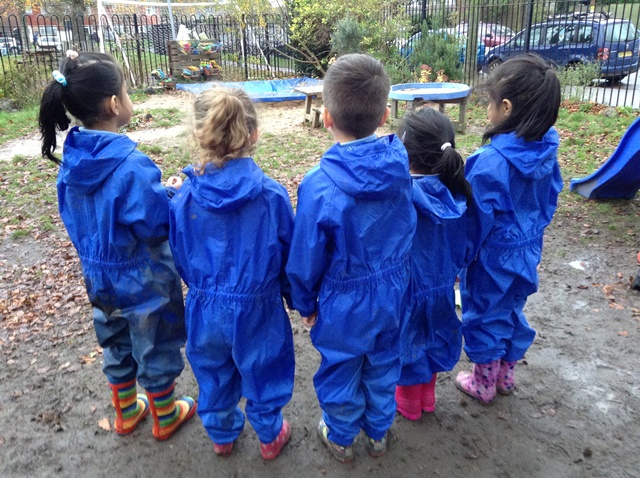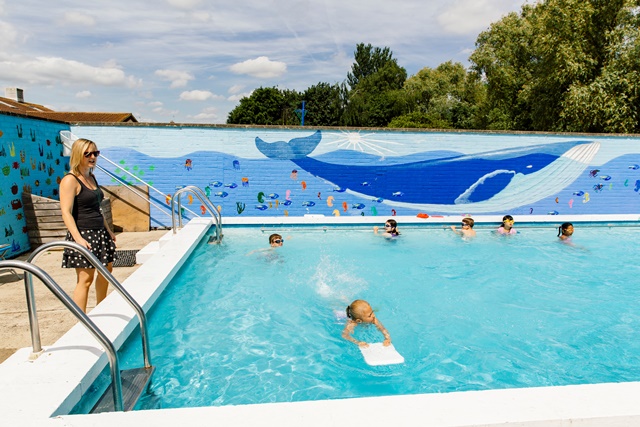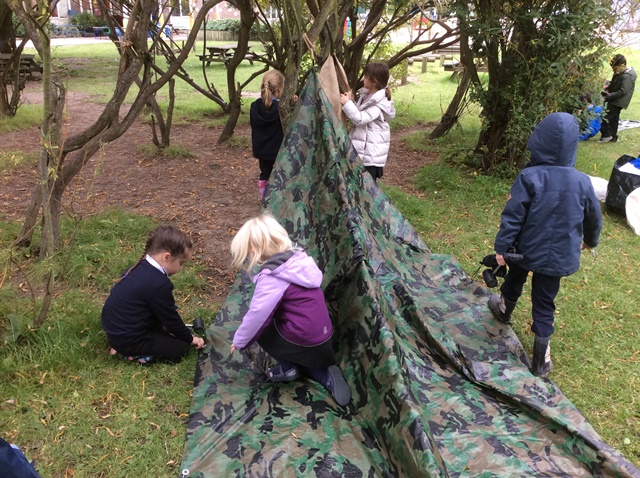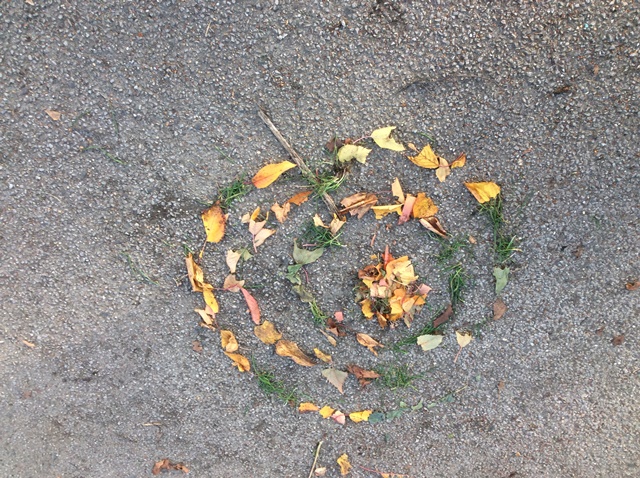Introduction
Outdoor learning is a core element of our curriculum and lessons. At Mayfield we believe strongly in the value of learning outdoors. Children and adults benefit from being outside. They benefit from a greater understanding of the environment, of seasonal change, the flora and fauna and biology of their local environment but it also promotes physical health and exercise, mental health, emotional well-being and results in happier well-behaved children.
How We Ensure the Outdoors Is Included In The Curriculum
We timetable compulsory outdoor lessons into every year group. We will go out in almost any weather conditions in this time. It is often referred to as ‘Out and About’ by the children. In addition to weekly outdoor PE, the outdoors lends itself to not only science or geography lessons but art, music, design, history, reading, writing and maths etc. Every subject can make use of the outdoors and we can be found outside at any point during the week, as well as during ‘Out and About’ lessons. You may also hear the children mention the ‘Mayfield Mile’. We have calculated the number of circuits around the field necessary to complete a mile. You may well see the whole school out there at the beginning of the day.

Knowledge and Skills Learnt
Children learn to be comfortable outdoors and have a better understanding of their environment. They connect with the idea of conservation, both on a local and global level and gain a variety of skills which will help them with their future working relationships and employment. Some of the skills children improve include working cooperatively to solve a task or share equipment, developing resilience, trying different ideas and thinking ‘outside the box’, thinking creatively, listening to instructions, adapting to change, taking on responsibility and appreciating others’ contributions and views.
High-quality outdoor learning experiences are proven to:
- develop reflective and inquisitive thinking along with problem-solving approaches in ‘real’ situations
- encourage holistic development of children
- develop resilience and adaptability in occasionally adverse circumstances
- allow children to become more able to identify hazards and risks
- develop a love, appreciation and respect for nature and all that is living
- develop an understanding of how we can look after our environment
- develop self-awareness, confidence and self-esteem
- develop collaborative-working and communication skills
- provide positive health benefits – both physically and mentally – and assist gross and fine-motor development
- develop a lifelong love of the outdoor
All these skills help to reinforce our school’s ethos and core values.
What Mayfield Offers
We are very fortunate to have fabulous grounds! Apart from the field and playgrounds we have an outdoor classroom, a conservation area with pond and equipment shed, a willow tree arch, climbing logs, a digging area, raised beds, a quiet garden, a trim trail, a large tepee, a refurbished ‘Alice in Wonderland’ themed double decker bus, a fire pit with log seating, den-making equipment, an outdoors shed full of art and science equipment exclusively for outdoors’ use, an imagination shed full of large equipment to design, build and play with and a swimming pool! We have the opportunity to make use of these to the advantage of all of us. Our grounds are open for all to enjoy after school hours too.
Research
Children who are used to going outside for long periods of time on a regular basis are more likely to be happy to go outside later in their lives for exercise which benefits them both mentally and physically. Research has shown that children are spending less time playing outdoors than at any other time in history. In 2011, a study commissioned by Planet Ark found that there has been a dramatic shift in childhood activity from outdoor play to indoor activity in the space of one generation. This generation spends a lot of time watching screens. Doctors are now prescribing outdoor pursuits rather than drugs for mental health and well-being. Arts subjects and the outdoors especially have a positive impact on mental health.
We can provide further evidence if you are interested. To start you might wish to view: Project Wild Thing
Out and About: An Example Of How It Works
Year 1 and year 4 have their ‘out and about’ sessions together, usually working with their book buddies who they also read with once a week. These sessions are on a weekly basis for 1 hour minimum each week. The 2 classes are divided into 4 groups and spend half an hour on 2 activities, experiencing the other 2 activities the following week. For example-
- Design and build a ship in teams using KS2 play shed large equipment. Explain your design. What tasks do each of you have? Show and explain to other groups.
- Conservation area- long term study of seasonal changes –trees, animals, pond, weather, microscopes, questioning, discussion, drawing and research.
- Gardening: planting seeds for raised beds, labelling, designing the bed, discussing gardening issues.
- Using art equipment in outdoor shed and collect leaves, twigs etc. to produce an Andy Goldsworthy inspired artwork.
- Set up the premise for the half term’s sessions: You are an RAF pilot who has crash landed in the countryside somewhere en route to Berlin. What will you need to survive?
Fire and shelter – split the year so that half build shelters using the den making equipment, and half light fires (and discuss smoke signals if there is time!)
Resources needed: den equipment, fire lighting equipment (flint/fire starters, potentially fire pit)
- Making charcoal. Coppice appropriate wood, make tins, discuss scientific understanding.
Resources needed: willow, secateurs, tins, drill, fire
- Science week – explore the adaptations of the local flora and fauna and log findings and diagrams in a science journal.
- Code breaking, how could you ensure that your messages aren’t intercepted|? Use the children’s charcoal to create coded messages and break each other’s (Morse code – then create their own codes)
Resources needed: charcoal
- (With Cambridge curiosity and imagination- Artscapers) At some point prior, children make paper (making paper from newspaper). Children use their charcoal and paper to write poetry inspired by their experiences of having survived in an unknown landscape. Explore the outdoors through senses, and use ideas for the poetry. Have ready to perform around the fire for the end of the session.
Resources needed: paper, charcoal, fire pit
- Create a collage from natural resources to reflect the experience of having been stranded and survived from the land.
Spirals Week
This is a special week which occurs every term. The usual timetable is abandoned, lessons differ from the norm and teachers spend time with individual children in a one to one discussion. It is an opportunity to explore different styles of learning (especially in art, history and science). Spirals week can cover topics or skills not covered by the curriculum or look at a topic in more depth than usual. The week can also be on a theme chosen by the children. There is more freedom for children and adults and a higher focus on learning outside the classroom.
Nature Explorers Club
We also have a club for those who love to spend even more time being outdoors. Amy Ellis is a former parent and runs 3 clubs a week at Mayfield for different age groups based on Forest School principles. She has experience and training from the Forest School organisation. She has an amazing knowledge of the natural world and delivers that knowledge through organised teaching activities and child-centred ‘Forest School’ principles.(link)
“Education is not about delivering a curriculum. It is about giving children the chance to extend their life skills. It is about developing their confidence. It is about fostering their resilience and sense of reliability. And – let us not forget – it is about enjoyment, engagement and excitement about venturing out into the real world, with all its capacity for uncertainty, surprise, stimulation and challenge.”
Tim Gill (Risk Educationalist expert)
















